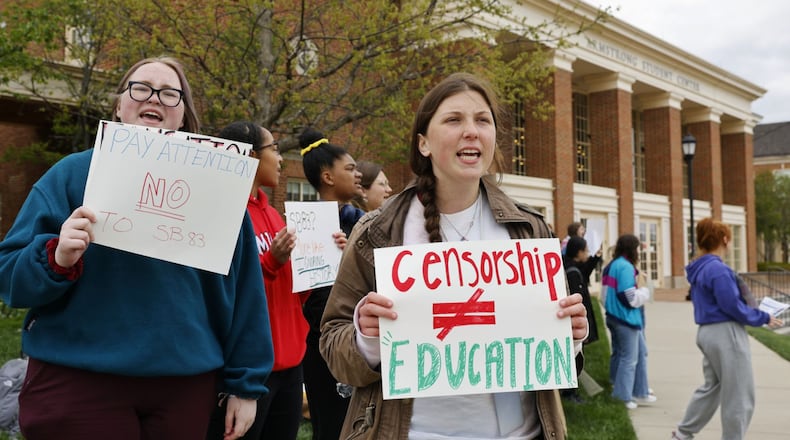The bill, which has been a priority for the Senate, has been in the House since May 2023. Its time in the House has been marked by apprehension from Stephens, who has repeatedly not given the bill a vote due to his belief that it didn’t have the votes.
“Ohio needs higher education reform and the time to display leadership in the House on this bill has come and gone,” Cirino told reporters. “That’s why I’m not interested and will not participate in discussions, respectfully, in the summer.”
Among the many changes S.B. 83 would have brought, Ohio’s public universities would be barred from requiring diversity, equity and inclusion (DEI) training; each would be required to swear off endorsing or opposing most “controversial” beliefs or opinions and affirm that they will not try to alter students’ political beliefs; and it would block university faculty from collectively bargaining on certain matters.
The bill has faced ardent opposition from the left, as well as from universities and faculty groups. Cirino himself noted that one of the bill’s opposition hearings was one of the the longest committee hearings on record at seven-and-a-half hours.
“Cirino’s planned right-wing takeover of higher ed is not about quality education or bias in academia or helping students,” wrote John McNay, University of Cincinnati history professor and former president of the American Association of University Presidents Ohio conference, in an opinion piece in the Dayton Daily News last year.
“It is all about well-heeled conservative groups wanting to control the education of young Ohioans and impose their own ideological beliefs through Cirino’s bills,” McNay wrote.
S.B. 83 may be delayed, but it isn’t dead, its backers say.
“We’re going to wait for a more favorable environment in the House before (S.B.) 83 comes back to discussion,” Cirino said.
That “more favorable environment” could come in the next general assembly, Cirino said, in which there’s a sturdy chance that term-limited Senate President Matt Huffman, R-Lima, gains control over the House. Or, it could come following November’s election in “lame duck” session, when the legislature returns from their summer break and is expected to continue the tradition of passing bills left and right before the General Assembly comes to a close.
Cirino made compromises in an attempt to get the bill past the House, and said his college campus reform efforts could look starkly different in the future.
“It depends when this comes up. If it comes up in lame duck, it will likely be the bill as it is today,” Cirino said, noting that he wouldn’t be open to too many changes. “If it starts fresh in the new (general assembly), then all bets are off and the bill will look different than it does today.”
Cirino stopped short of casting doubts on Stephens’ contention that there wasn’t enough support in the House to pass S.B. 83. Instead, he said Stephens never truly pushed the bill to his Republican caucus, despite calling it a priority.
“I think we could have easily gotten in excess of 60 votes, quite frankly, but he just never decided to get behind it and that’s his choice, certainly,” Cirino said.
After a nearly 12-hour House session before going on break, Stephens told reporters that he still believed there wasn’t enough votes to get the bill passed, though he didn’t clarify what specific issues were holding the bill up. He again called it an important issue.
“I never want to shut down any opportunity to discuss that issue, it’s not how I operate,” Stephens said.
Montgomery County Rep. Tom Young, R-Washington Twp., who chairs the House Higher Education Committee, told this news organization that putting off the vote on S.B. 83 was an “opportunity lost.” He said he doesn’t know how a similar effort would shake out next general assembly, but believes that the bill, as it is, is “a very good bill; a positive bill.”
“We had a transformational bill that would have changed the way that higher education is viewed, which, whether people believe it or not, in Ohio has not been viewed by many as a shining star,” Young told this news outlet.
He believes S.B. 83 would have been a doorway toward more state support for higher education.
Young, like Cirino, wouldn’t cast doubts on the sincerity of Stephens’ contention that there weren’t enough votes, despite his own absolute certainty that S.B. 83 would have passed on the House floor. Behind closed doors, Young had circulated a loose vote count petition in the lead up to last week’s legislative climax.
“He felt that he didn’t have the votes. I felt we did, and I felt that we should vote up or down, win or lose, and that’s what legislation is about,” said Young. “...Sometimes, you’ve got to call peoples’ bluffs and you go to the floor and vote.”
For more stories like this, sign up for our Ohio Politics newsletter. It’s free, curated, and delivered straight to your inbox every Thursday evening.
Avery Kreemer can be reached at 614-981-1422, on X, via email, or you can drop him a comment/tip with the survey below.
About the Author

